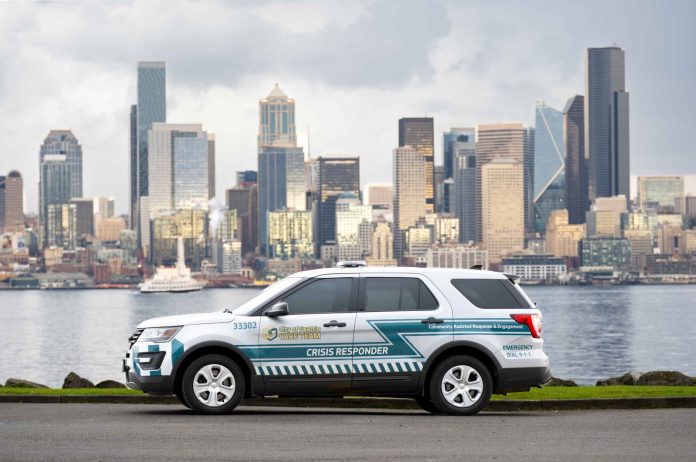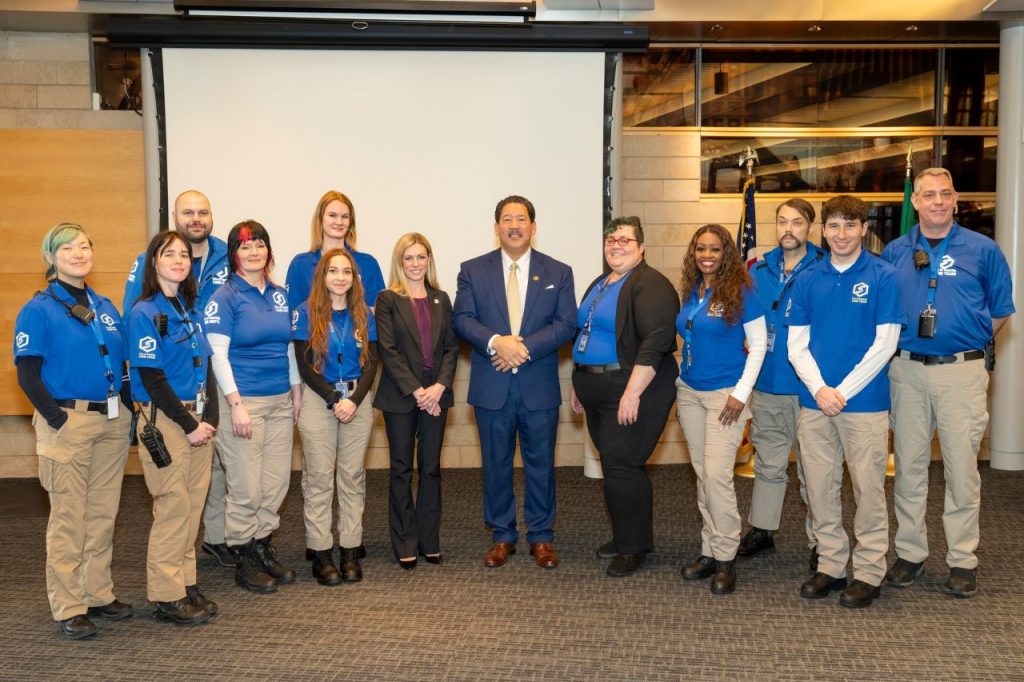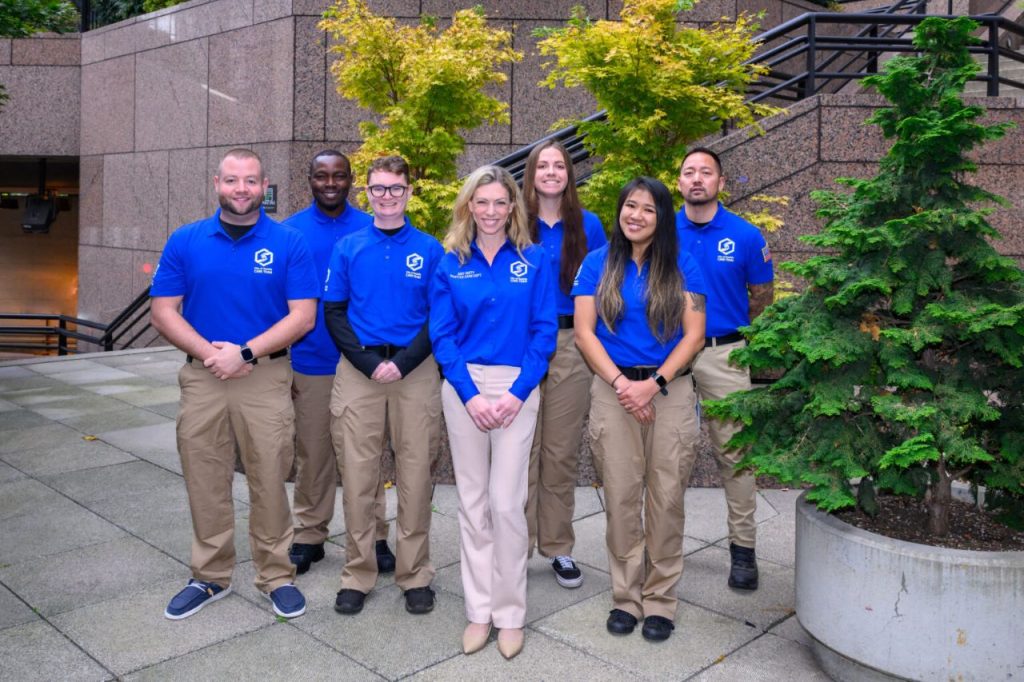
Seattle is seeking a fix at the state legislature to grow its civilian crisis response program despite roadblocks from the Seattle Police Officers Guild.
Seattle has been struggling since 2020 to fully implement an alternative crisis response program, dispatched by 911 and staffed by civilians who are trained to handle certain types of behavioral health calls. During this legislative session, Rep. Shaun Scott (D-43rd, Seattle) has introduced a bill (HB 1816) to help Seattle finally meet its goals.
What the bill does
As written, HB 1816 achieves three main objectives. It provides the right for a city to establish a civilian alternative response team to respond to behavioral health calls that don’t involve a weapon or active violence. The city’s executive would make basic calls about how the program is set up: which department the team would be housed within, how big it would be, training requirements, where and when the teams would operate, and which call types they would answer.
Most importantly, the bill says that cities with crisis response teams are prohibited from collectively bargaining with law enforcement personnel about the above program elements. In Seattle’s case, the Seattle Police Officers Guild (SPOG) has fought to limit the scope of work for the city’s fledgling civilian crisis response program, slowing its expansion. Any conflicting provisions in a collective bargaining agreement with SPOG ratified in 2026 or later would be preempted, whereas any agreement completed before that date would be unable to be extended or renewed.
HB 1816 protects the data of people assisted by alternative response from the Public Records Act, in line with the state’s My Health My Data Act, shielding sensitive mental health information from prying eyes — or potential federal overreach.
While the bill is currently narrowly tailored to apply to cities with a population of over 500,000 in Washington State (which currently applies only to Seattle), Scott indicated during the bill’s hearing that he’d be open to considering lowering that number or potentially allowing counties to be included.
The promise of civilian response
Pitching the bill as a response to a crisis around police killings and stalled reform, Scott said he believed both Jaahnavi Kandula and Charleena Lyles would still be alive today if this policy had been in place at the time of their deaths. Police killed Lyles in 2017 after she called them for help with a mental health crisis, and Kandula was killed by a speeding officer who was responding to a drug-related call that Scott believes would have benefited from alternative response.
“We are living through a generational referendum on guild public safety policies that cost lives,” Scott told The Urbanist. “We have seen too many unfortunate headlines, innocent loss of life, disproportionately people of color, and it’s a public policy failure. As a lawmaker, I believe that it is our role to craft policy that helps to address the concerns that everyday people in our state have, and this is one measure that I think is almost universally popular in our state.”

The idea of civilian response gained mainstream popularity during the George Floyd protests of 2020, when cities across the United States faced mass demonstrations against racist policing and brutality. Many protesters urged cities to stand up alternative response programs, where people without a badge and gun could respond to crisis calls, and lauded already existing programs, such as CAHOOTS in Eugene, Oregon.
A national poll conducted in the summer of 2023 found that 85% of people wanted a mental health response to someone experiencing a mental health, drug, or suicide crisis, A poll also conducted in summer of 2023 by The Seattle Times and Suffolk University found that 75% of Seattle residents polled supported shifting some emergency calls from police to unarmed city workers.
Dr. Shannon Cheng, chair of People Power Washington, a grassroots organization that advocates for equitable public safety, pointed out that not every person feels safe receiving a traditional law enforcement response. (Full disclosure: I used to volunteer with People Power Washington from 2020 to 2023.)
“There are some who affirmatively do not want law enforcement contact when seeking help,” Cheng said. “The assumption that all communities and callers into 911 would feel safe having an armed officer respond to their situation misunderstands the fundamental reasoning behind calls for a civilianized alternative crisis response.”
However, in Seattle, full implementation of a civilian crisis response has been repeatedly stymied. Former Mayor Jenny Durkan proposed a “Triage One” program in the summer of 2021 that still hadn’t been implemented by the time she left office at the end of the year. It fell to Mayor Bruce Harrell to make the attempt to build a new response system, which eventually became known as the Community Assisted Response and Engagement (CARE) pilot program, first launched in October of 2023.

“The CARE response is a significant missing piece of the diversion puzzle and the crisis continuum. It is uniformly popular and has been embraced across political ideologies and throughout first response,” CARE Chief Amy Barden said at the bill’s hearing last week. “People have joked that my work is the only thing Seattle agrees on.”
“Last year, the [CARE] team responded to over 1,200 dispatch calls and spent an average of 35 minutes on the scene providing direct behavioral interventions, crisis de-escalation, transportation to resources like shelters and day centers, and connecting people with basic supplies like food, water, clothing, and hygiene items,” said Callie Craighead, a spokesperson for the Mayor’s Office. “This not only helps community members in need but also frees up scarce police resources to answer the calls where they’re needed most.”
“I’ve got efficacy, and I can also save millions and millions of dollars and have better outcomes,” Barden told The Urbanist. “I don’t think people understand how important it is to think of this as building up first response.”
At the hearing, even those speaking in opposition to the bill affirmed their support of alternative crisis response more generally.
The case for state intervention
Unfortunately, the CARE response program has been limited by a memorandum of understanding (MOU) with SPOG that limits the total number of responders to 24, states the program must be dual dispatch (meaning SPD officers dispatched simultaneously with CARE responders), and narrowly restricts CARE to responding to two call types: person down calls and wellness checks.
Thus far the City has been unable to successfully negotiate with SPOG to update this MOU. Last year, SPOG won a new contract that gave their members 24% raises, but the limitations on the CARE team were not addressed.
“That is why this bill matters,” Barden said. “It’s because I should have the same autonomy and authority to act within my already designated body of work. Seattle Police [Officers Guild] does not dictate how many firefighters there are. They don’t prohibit mobile integrated health from expanding our care navigation. It’s clear that’s a medical body of work and actual fires, and it’s the same thing on the criminal justice side. I’m not telling them how many folks they can have in their co-response unit or anything like that, but I should have the same latitude.”
Barden emphasized that she wants autonomy over the size of the CARE team, the locations where they operate, and the hours they work.
“We waste money with these long, protracted negotiations. And I know that I’m being used in a tactical way,” Barden said. “[CARE] is a popular development in the city, across ideologies, across communities and interest response, and so it does put me in sort of a perpetual hostage negotiation, where it’s the popular thing that everybody wants.”
Scott shared skepticism that negotiating the parameters of civilian response with SPOG would be fruitful or promote public safety.
“There’s a reason why this bill is rising to the level of the state legislature,” Scott said. “If the city believed that they had the ability to solve this issue institutionally at the local level, it wouldn’t be kicked up to the legislature.”
Cheng was more blunt. “The conversation at the public hearing [for the bill] didn’t appreciate how SPOG, unlike other unions around the state, has a documented history of using collective bargaining to actively obstruct popular, community-supported reforms in Seattle,” Cheng said.
Relatedly, patience with SPOG is wearing thin among police accountability advocates like Cheng.
“Across my near-decade of advocacy in the police accountability and alternative response spaces, SPOG has felt impervious to the community’s demands for better policing in Seattle – they don’t care about public opinion, they don’t care about being under consent decree, they don’t care about proven best practices,” Cheng continued. “Seattle wants a robust civilian alternative crisis response and has already given SPOG the largest pay raise of any City employees, yet SPOG continues to willfully obstruct the CARE program’s successful implementation by using contract negotiations to limit its scope and staffing, prioritizing their own control over public safety.”
Seattle Police Department Assistant Chief Daniel Nelson explained the issue in his own testimony. “With the union I think there is a path forward. It’s just, as mentioned, our bargaining cycles are extremely long, and we have need now.”
The coalition backing the bill
HB 1816 is supported by a wide range of groups and individuals, including the Mayor’s Office and SPD, the Behavioral Health Crisis Outreach and Education Center at the University of Washington, the SODO Business Improvement Area, the President of the Seattle Dispatchers Guild, and People Power Washington.
“Mayor Harrell created the Community Assisted Response and Engagement (CARE) department to diversify emergency response options and has continued to invest in its expansion,” Craighead said. “He is supportive of House Bill 1816 to continue to strengthen the CARE Department’s role as the City’s third public safety department alongside Police and Fire and increase alternative 911 responses for those in need.”
Perhaps most striking was the supportive testimony of SPD’s Nelson.
“Alternative responses to non-criminal 911 calls is crucial for ensuring that individuals in crisis receive the most appropriate care while allowing law enforcement to focus on serious public safety concerns,” Nelson said. “In essence, it allows officers to respond more quickly to actual versus imagined threats to safety.”
“We have proven that the rank and file appreciate the service, and they leverage the service,” Nelson continued. “And we have in King County a great many community members and very limited social supports to help supplement police and fire responses.”
Nelson explained that when the police call the mobile crisis teams led by the Downtown Emergency Service Center (DESC), they typically receive response times of two to three hours since the teams cover the entirety of King County, whereas the CARE team will show up in 11 minutes. He also addressed concerns about the safety of the CARE team, explaining they have a protocol already in place to maximize civilian responder safety.
Jennifer Clayton, the President of the Seattle Dispatchers Guild, also spoke in favor of the bill. “Over the years, we’ve seen several alternative response programs come and go through Seattle, but most noticeably, this one has become the most impactful that I have seen with these community crisis responders,” Clayton said. “The public asked for them by name. Officers regularly request their services so they can move on to more pressing calls, violent crimes, and the citizens request them.”
Clayton emphasized that 911 dispatchers have been trained to dispatch CARE responders safely. Both Barden and Scott also stressed that the wealth of available data on call types and outcomes allows CARE responders to be safely dispatched.
Labor opposition
The primary opposition to the bill is from labor, represented at the hearing by Teamsters Local 117 and the Washington State Labor Council.
“We can’t support legislation that preempts collective bargaining rights in a bill,” said Brenda Wiest, Vice President of the Teamsters Local 117. “It sets a pattern for other communities across the state who don’t want to complete the bargaining process or want to rush it through by dictating who they can or can’t bargain with.”
Joe Kendo from the Washington State Labor Council echoed her concerns.
“One of the impacts of this bill that I think is very concerning is it would then create a statewide model for circumventing bargaining rights, which we would absolutely expect to be advocated for in other circumstances by other cities for other challenging sets of work,” Kendo said.
Rep. Cindy Ryu (D-32nd, Shoreline), the Chair of the Technology, Economic Development, & Veterans committee where the bill was heard, encouraged labor to work with Scott to craft a compromise.
“We can’t just kill the bill because we have an urgency. We have FIFA coming, among many other events coming, and so I think just killing the bill is not the answer,” Ryu said.
“The crucial element that was not surfaced [at the hearing] was that I have already bargained CARE’s body of work,” Barden told The Urbanist. “CARE responders can go to priority 3 and 4 person-down and welfare-check calls. It is clear what my body of work is: these low acuity social work calls that police absolutely do not want to go to, and sometimes just decline to go. They won’t go. And even if we can compel them to go again, the average response time right now for priority three for police is 123 minutes, and that’s with improved staffing. That’s a non-response.”

“I think we’re going to be able to have a robust conversation with the Teamsters around how we can set good labor policy with this bill,” said Scott, who currently serves as the Vice Chair of the Labor and Workplace Standards committee. “There’s a lot that we can do to clarify what the intent of the bill is and work the language so that it’s not something that could be applied when […] other public sector workers come to the bargaining table.”
Barden similarly expressed strong support for labor and not setting a precedent of broadly preempting collective bargaining rights .
“Any time we’re going to set a precedent that could create an abuse of power in the future for bad actors, that is a completely valid concern. But I think that there is a way to amend the language to mitigate that concern,” she said.
The CARE responders themselves are likely to decide to unionize with the Teamsters, Barden and Teamsters officials noted.
Next steps
Rep. Scott is determined to see his bill through in spite of the obstacles.
“Make no mistake about it, the reason why this bill is being run and the reason why I wanted to take it up, is because it’s an issue of moral urgency,” Scott said. “The longer we go without adequate 911 response, the more acclimated we will become to seeing that people who needed help die or become victims of police violence. That should be unacceptable to all of our stakeholders, and that is the issue that I know all of us want to figure out a way to resolve.”
Ryu’s technology committee will take up HB 1816 in executive session on Tuesday, February 18, which positions it to potentially move forward ahead of the legislative session’s policy committee cut-off date of February 21.
Chief Barden stated her commitment to Seattle moving forward with not policing behavioral health calls that can be served by the CARE responders. Her preferred method is to have public sector, unionized employees offering that response.
However, should this bill not make it through the legislature this year, Seattle might have to try a different approach. Other cities like Atlanta and Denver have sidestepped the conversation with labor by working with non-profit organizations to provide emergency alternative response. If Seattle were to switch to this model of service, that would mean a real loss of union jobs in Seattle.
“I think in the public safety politics of old, we pit racial justice against labor rights,” Scott said. “This is a real test of our progressive reach and our commitment to progressivism — I should say, understanding that when we pit racial justice against labor rights, both lose.”
Legislators are accepting comment on HB 1816 online or via testimony during committee hearings, with the next being the House Committee on Technology, Economic Development, & Veterans executive session scheduled for 10:30am February 18.
Amy Sundberg is the publisher of Notes from the Emerald City, a weekly newsletter on Seattle politics and policy with a particular focus on public safety, police accountability, and the criminal legal system. She also writes science fiction, fantasy, and horror novels. She is particularly fond of Seattle’s parks, where she can often be found walking her little dog.

